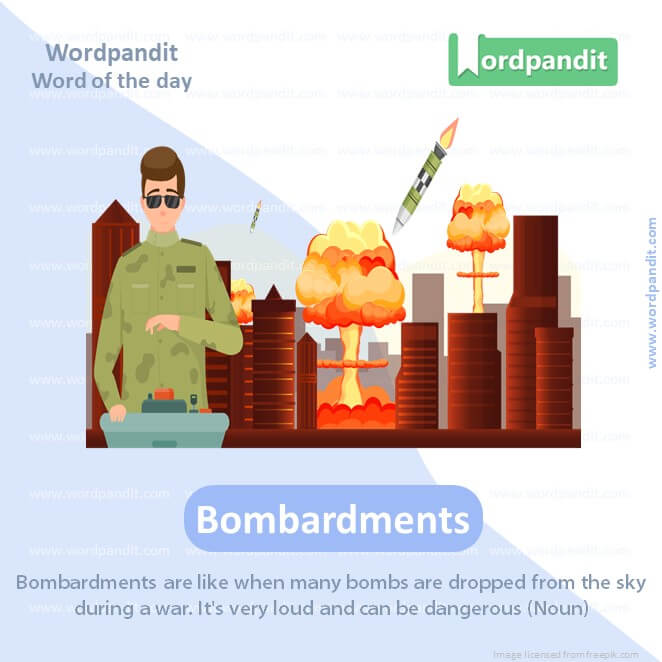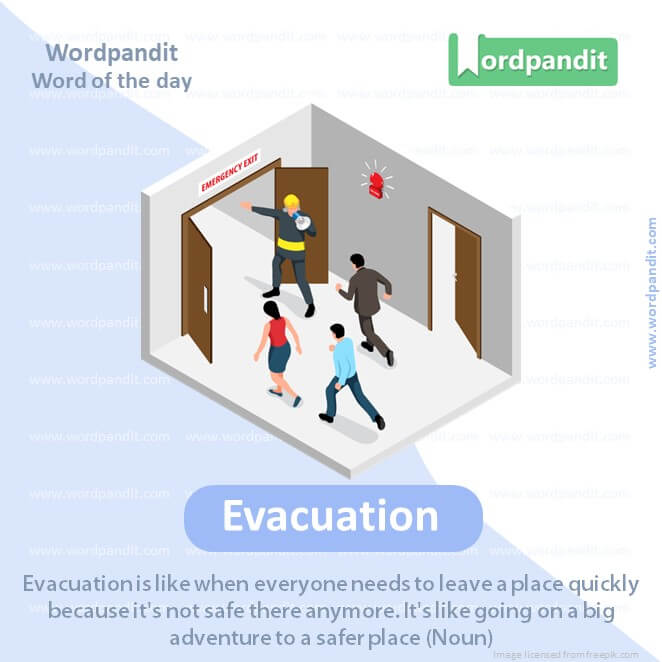Daily Vocabulary Words: List of Daily Used Words
Hi there. Welcome to this special section @ Wordpandit.
Our endeavour here is straightforward: highlighting important daily vocabulary words, you would encounter in The Hindu. This is your repository of commonly used words; essentially, we are posting a list of daily used words. Hence, this has significant practical application as it teaches you words that are commonly used in a leading publication such as The Hindu.
Visit the website daily to learn words from The Hindu.

WORD-1: Notorious
CONTEXT: The gangs, notorious for mass kidnappings from schools and colleges in recent years, maintain camps hidden in a vast forest.
SOURCE: The Hindu
EXPLANATORY PARAGRAPH: Notorious means when someone is very famous, but not for doing good things. It’s like when a person is known by a lot of people, but not because they are a hero or did something nice. (Adjective)
MEANING: Very famous, but not for doing good things (Adjective).
PRONUNCIATION: Noh-TOR-ee-us
SYNONYMS: Infamous, well-known for something bad, notorious
USAGE EXAMPLE:
1. The pirate captain was notorious for stealing treasure from other ships.
2. The movie villain was so notorious that everyone recognized him.
3. The bank robber became notorious after his big heist.
4. The haunted house on the hill was notorious for scaring people.

WORD-2: Bandit
CONTEXT: Nigerian military jets have carried out air strikes on a gathering of bandit militias, killing around 100 gunmen in the country’s northwest, two army sources with knowledge of the operation and local residents said.
SOURCE: The Hindu
EXPLANATORY PARAGRAPH: A bandit is like a bad guy who steals things or money from others. They often wear masks to hide their faces when they do bad things. (Noun)
MEANING: A bad guy who steals things or money from others (Noun).
PRONUNCIATION: BAN-dit
SYNONYMS: Outlaw, robber, thief, crook, criminal
USAGE EXAMPLE:
1. The bandit stole the golden treasure from the king’s castle.
2. In the old Wild West, there were many bandits robbing trains.
3. The bandit was finally caught by the brave sheriff.
4. Don’t be scared, the bandit is just a character in our storybook.

WORD-3: Bombardments
CONTEXT: Nigeria’s air force confirmed it had carried out bombardments in northwestern Zamfara State on Tuesday, but a spokesman said he could not yet provide details on the numbers killed.
SOURCE: The Hindu
EXPLANATORY PARAGRAPH: Bombardments are like when many bombs are dropped from the sky during a war. It’s very loud and can be dangerous. (Noun)
MEANING: Many bombs dropped from the sky during a war (Noun).
PRONUNCIATION: Bom-BARD-ments
SYNONYMS: Attack, assault, bombing, barrage, shelling
USAGE EXAMPLE:
1. The city endured relentless bombardments during the war.
2. The sounds of bombardments in the distance were frightening.
3. The soldiers took cover during the enemy’s bombardment.
4. The news reported the bombardments had stopped, and peace was coming.

WORD-4: Straddling
CONTEXT: The gangs, notorious for mass kidnappings from schools and colleges in recent years, maintain camps hidden in a vast forest straddling Zamfara, Katsina, Kaduna, and Niger states.
SOURCE: The Hindu
EXPLANATORY PARAGRAPH: Straddling is like when you stand or sit with your legs on both sides of something, like a big rock or a wide log. It’s like a cowboy riding a horse. (Verb)
MEANING: Standing or sitting with your legs on both sides of something (Verb).
PRONUNCIATION: STRAD-ling
SYNONYMS: Spanning, standing astride, straddle, sitting across
USAGE EXAMPLE:
1. The adventurous hiker enjoyed straddling the fallen tree across the river.
2. The cowboy was skilled at straddling his horse.
3. She was straddling the bicycle as she waited for her friends.
4. Straddling the fence, he couldn’t decide which side to choose.

WORD-5: Evacuation
CONTEXT: “Dead bodies, which were badly burnt, littered the bushes. They were so many that the bandits abandoned many to make room for the evacuation of the injured,” the officer said.
SOURCE: The Hindu
EXPLANATORY PARAGRAPH: Evacuation is like when everyone needs to leave a place quickly because it’s not safe there anymore. It’s like going on a big adventure to a safer place. (Noun)
MEANING: Leaving a place quickly because it’s not safe (Noun).
PRONUNCIATION: E-vac-u-A-tion
SYNONYMS: Exile, departure, exodus, retreat, escape
USAGE EXAMPLE:
1. The firefighters ordered the evacuation of the building due to the fire.
2. During the hurricane, many families had to go to a shelter for evacuation.
3. The school practiced an evacuation drill to prepare for emergencies.
4. The evacuation plan helped everyone get out of the danger zone.
WORD-6: Stalling
CONTEXT: “Why are they (Central Adoption Resource Authority) stalling adoptions? Why CARA is not doing it. Hundreds of children are awaiting adoption in hope of a better life,” the CJI observed.
SOURCE: The Hindu
EXPLANATORY PARAGRAPH: Stalling is like when something stops moving or working because it has a problem or someone is taking too long to do something. It’s like a car that won’t start or a toy that’s not working. (Verb)
MEANING: Something stops moving or working due to a problem or delay (Verb).
PRONUNCIATION: STALL-ing
SYNONYMS: Delaying, hesitating, procrastinating, stopping, pausing
USAGE EXAMPLE:
1. The car kept stalling on the way to the mechanic’s shop.
2. The student was stalling, not wanting to start their homework.
3. The plane was stalling in mid-air, causing concern among the passengers.
4. The meeting was constantly stalling due to technical issues.
WORD-7: Abysmal
CONTEXT: An advocate, appearing for one of the petitioners, stressed on the need for simplification of the adoption process and said adoption of children with special needs is more abysmal.
SOURCE: The Hindu
EXPLANATORY PARAGRAPH: Abysmal means something is really, really bad, like the worst thing you can imagine. It’s like getting a very low score on a game or a test. (Adjective)
MEANING: Really, really bad (Adjective).
PRONUNCIATION: Uh-BIZ-muhl
SYNONYMS: Terrible, dreadful, awful, horrible, appalling
USAGE EXAMPLE:
1. The weather on that rainy day was abysmal; we couldn’t go outside to play.
2. The movie got an abysmal rating because it was not enjoyable at all.
3. The chef was disappointed with the abysmal taste of the soup he accidentally made.
4. Her singing was so abysmal that it made everyone cover their ears.
WORD-8: Petitioners
CONTEXT: An advocate, appearing for one of the petitioners, stressed on the need for simplification of the adoption process and said adoption of children with special needs is more abysmal.
SOURCE: The Hindu
EXPLANATORY PARAGRAPH: Petitioners are like people who write letters or ask for something they really want. It’s like when you ask your parents for ice cream or a new toy by writing a note. (Noun)
MEANING: People who ask for something they really want (Noun).
PRONUNCIATION: Puh-TI-shuh-nurs
SYNONYMS: Requesters, askers, applicants, supplicants, solicitors
USAGE EXAMPLE:
1. The petitioners gathered signatures to save the neighborhood park.
2. The petitioners submitted their request to the city council.
3. Many petitioners wanted the school to have a longer recess.
4. The petitioners hoped their letters would convince the mayor to make a change.
WORD-9: Blared
CONTEXT: “On the first day (when the conflict broke out), sirens blared twice following which we moved into a shelter. But there was not much of a damage thereafter thanks to the Iron Dome (Israel’s air missile defense system). After that, it was mostly safe and the public transport also operated as usual,” said Ms. Shibu.
SOURCE: The Hindu
EXPLANATORY PARAGRAPH: Blared is like when a sound is very, very loud and it hurts your ears, like a horn honking loudly or music playing at top volume. (Verb)
MEANING: A very loud and piercing sound (Verb).
PRONUNCIATION: Blayrd
SYNONYMS: Roared, blasted, thundered, shouted, boomed
USAGE EXAMPLE:
1. The sirens blared as the fire trucks rushed to the scene.
2. The music blared from the speakers at the party.
3. The alarm clock blared, waking everyone up suddenly.
4. The car’s horn blared loudly when someone cut it off in traffic.
WORD-10: Presumptuous
CONTEXT: In a statement, the CAG’s office said: “To set the record straight, matters of transfer and postings are a matter of administrative convenience and to read ulterior motives into these is highly presumptuous.”
SOURCE: The Hindu
EXPLANATORY PARAGRAPH: Presumptuous is when someone acts like they know everything and doesn’t listen to others. It’s like thinking you’re the boss when you’re not. (Adjective)
MEANING: Acting like you know everything and not listening to others (Adjective).
PRONUNCIATION: Pre-ZUMP-choo-us
SYNONYMS: Arrogant, bold, overconfident, forward, pushy
USAGE EXAMPLE:
1. It was presumptuous of him to tell the teacher how to do her job.
2. She felt that his presumptuous attitude made him difficult to work with.
3. Being presumptuous and interrupting others during a conversation is impolite.
4. The young boy’s presumptuous behavior surprised the adults.
Vocabulary English Words
In the enchanting performance of language learning, ‘vocabulary English words’ make up the musical notes that help us create harmonious communication. Mastering these words can seem like an arduous task at times; however, using the right learning strategies can make the process of learning ‘vocabulary English words’ smooth and enjoyable.
A crucial principle for learning ‘vocabulary English words’ is to focus on understanding, rather than memorizing. Engaging with varied materials such as novels, news articles, podcasts and digital content will expose you to a wide range of words in different contexts, giving a deeper insight into their meaning and usage.
Employing memory-enhancing techniques can significantly aid in the learning of ‘vocabulary English words’. Tools such as flashcards, language-learning apps, and mnemonic strategies ensure an effective and long-term learning experience. Mnemonic devices, linking words with personal and relatable stories or images, can help in creating better associations and improving recall.
Practice plays a vital role in mastering ‘vocabulary English words’. Using the new words in your routine conversations, written correspondence, or even digital interactions adds a practical aspect to your learning, making these words a part of your active vocabulary.
Furthermore, leisure activities such as crosswords, word games, or simple vocabulary quizzes are effective ways to make the learning of ‘vocabulary English words’ fun and interactive.
To conclude, the journey of learning ‘vocabulary English words’ demands a multi-faceted approach woven into our daily life. A balanced mix of understanding, usage of memory-enhancement tools, active application, and leisure activities can considerably ease the process of mastering ‘vocabulary English words’. Remember, each word learned is a tiny victory, bringing you one step closer to impeccable fluency and articulate expression in the beautiful symphony of the English language.













